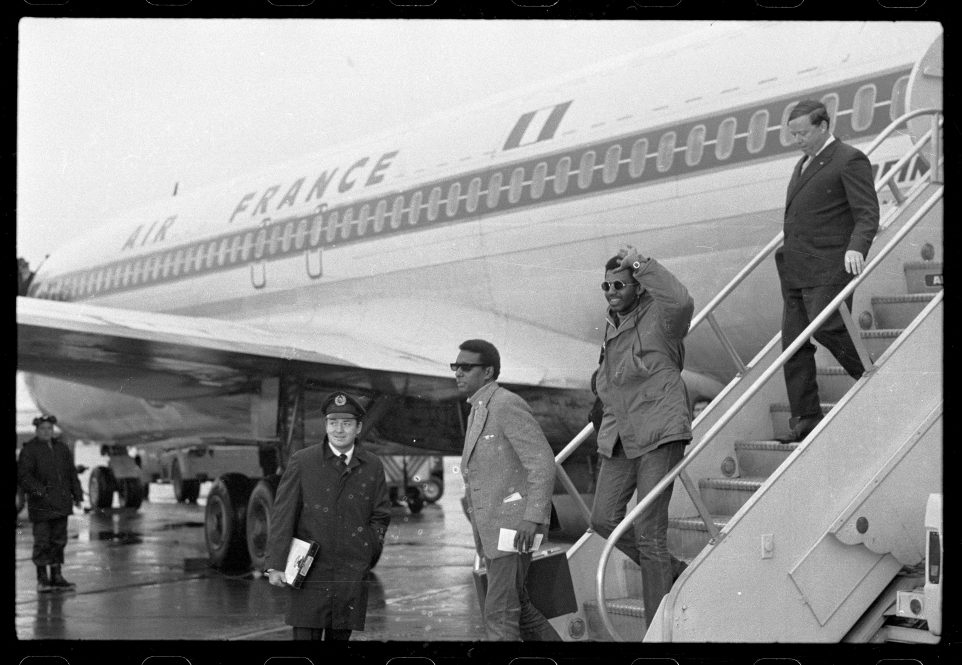When Grégory Pierrot talks about growing up in northeastern France near Luxembourg and Germany, he uses the word “American” at least a half dozen times.
“I’ve had a long personal relationship with American culture,” he says, describing how as a boy he’d listen to American music and write down as many words as he could catch to translate into French, so he could figure out what was being said.
Now an associate professor of English at UConn Stamford who teaches African American literature, Pierrot says he’s been a student of American culture – its literature, music, and history – since he was a teenager, even as his methods have turned more intellectual.
His latest project for Rot Bo Krik, “It was Nation Time: Fictions of African American Revolution,” which looks at African American literature during the Black Power era and how readers of French translations received the works, might be the best way to encapsulate all that has intrigued him since his youth.
“I’m very interested in the way literature, music, and film – all those things that may seem less serious than politics or unrelated to it – actually convey most of what people think they know about a given moment or given political period,” Pierrot says. “Ideas are conveyed in those texts, in those songs, and in those films, and they have much more of an impact on us than scholarly studies or political speeches even.”
Pierrot says the French, even though an ocean away, are fascinated by what happened in America in the mid-1960s to 1970s, those volatile years after Jackie Robinson and Rosa Parks when the Civil Rights and Voting Rights acts took effect, the Black Panthers took rise, and Martin Luther King Jr. took his last breath.
Writers including John A. Williams, best known for “The Man Who Cried I Am”; Chester Himes, who wrote a series of “Harlem Detective” novels; and Sam Greenlee, author of “The Spook Who Sat by the Door” told fictionalized but compelling accounts of what being Black in the United States was like.
“This is such a fraught moment in American history, with fraught ideas in American politics,” Pierrot says. “This idea of a ‘Black Revolution,’ while it wasn’t greatly popular, it was in the air. So, when novels like these came out everybody would be talking about them.”
Through the years, for instance, Williams’ novel “Sons of Darkness, Sons of Light,” which imagined the outset of such a revolution, and his “Captain Blackman,” which traces Black soldiers’ contributions to the Army, have been forgotten – along with so many other works, even as those stories echo in the events of today.
“It’s shocking just how much the plots in these novels often sound like they could have been written yesterday,” Pierrot says. “In quite a few of these, either the premise or one of the important events in the plot has to do with young African American boys being shot by police for no reason. Others have to do with the rise of extreme right-wing politics. To that extent, they are very much of this moment.”
Of course, France and the U.S. have been connected since long before the American Revolution gave this country its independence from Britain, and France gifted the Statue of Liberty to celebrate a century of liberty.
France has been the place where African Americans, particularly artists, have fled when wanting or needing to escape racism in North America, Pierrot explains, as France, perhaps infamously, prides itself as being a place where racism doesn’t exist.
“Racism in France was different enough than what was happening in the U.S. that it felt like relief for African Americans who still get treated very differently than other members of the African diaspora in France,” Pierrot says. “Historically, to put it simply, it’s often been easier to be African American than to be Black and French in France.”
In research for the project, funded as part of a year-long fellowship from the UConn Humanities Institute, Pierrot says that even though he’s built a career absorbed in the literature of this period, he found himself fascinated recently by Malcolm X’s connection to France, which remains largely unknown among citizens there despite pop culture references to him.
In the 10 years before the Black activist was assassinated in 1965, despite his growth in the U.S. as a name known around the dinner table, he was mentioned only a handful of times in the French newspaper of record.
Malcolm X traveled to Paris in November 1964 to deliver a speech and attempted to visit a second time in February 1965 but was stopped by French customs at the border and blocked from entry, Pierrot says. Three weeks later he was killed and only then did the French public start hearing about him.
“The novels from this time, even though they’re works of fiction, are historical artifacts. They give us a view of that moment that we may have forgotten,” he explains.
“We all have a sense of the 1960s based on the media – films, books, and music – that we consume,” he continues. “There was flower power and Woodstock, but that’s not all the 1960s were. It was a violent time. There were assassinations left and right and wars around the world. The texts I study offer elements of American history that many people do not know or do not quite remember.”



